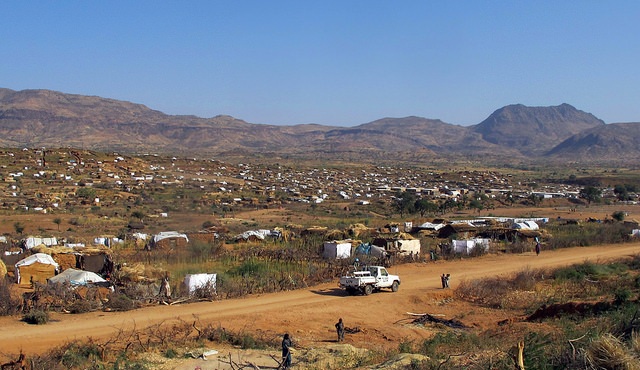Humanitarian and early recovery activities begin in Jebel Marra’s Golo

March 3, 2017 (KHARTOUM) – UN agencies and international aid groups are working with the Central Darfur authorities to rehabilitate local health and education facilities and provide humanitarian assistance to civilians who returned to Golo town in Jebel Marra.
Golo or Rokoro town is located in central and north Jebel Marra and administratively is part of Central Darfur State. The fighting between the government troops and rebel fighters during the past year (2016) forced about 100,000 civilians to flee the whole mountainious area.
However, the Sudanese government declared the area of Jebel Marra free of rebels and, in line with an agreement reached with the American administration, opened humanitarian access to the aid groups and vowed to implement a recovery programme in the affected areas.
Reporting about the humanitarian activities taking place in Golo, the (OCHA) said in its bimonthly bulletin that the World Food Programme (WFP) would “distribute one-month food rations (230 metric tonnes) to 25,564 IDPs and returnees”.
While the Danish Refugee Council (DRC) has identified some 4,000 people (800 families) to whom it will distribute emergency shelter and essential household supplies. The Danish group has already distributed agricultural supplies to 250 returnee families in Golo and plans to start a food voucher system for 600 vulnerable IDP families.
Concurrently, the UN Children’s Agency (UNICEF), WFP and the State Ministry of Education (SMoE) have started a classroom rehabilitation programme. UNICEF provided classroom seating for 3,000 students in five schools as the SMoE rehabilitated 16 classrooms in two schools. The WFP will implement on the other hand a school feeding programmes.
Regarding the humanitarian medical activities, the report says that the UNICEF has established a cold chain system in Golo hospital and stocked it with vaccines. While the International Medical Corps (IMC) provided a number of health workers to conduct routine vaccinations.
“IMC has also sent basic medicines, an emergency response team, two medical doctors, one public health officer and 27 paramedical staff (seconded by the SMoH) to the primary health care and nutrition centres in Golo hospital as well as in Boori and Jokosti villages,” OCHA further said.
Also, the state ministry of health, UNICEF are implementing a training programme for health workers to reduce the number of patients forced to come to the Golo hospital. In the same trend, international NGO Catholic Relief Services (CRS) will set up three out- patient therapeutic centres (OTPs) in Jokosti, Borri and Tero villages.
UNICEF donated a drilling rig to the Water and Environmental Sanitation Department (WES) in Golo to improve water services.
(ST)
